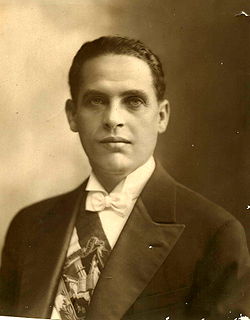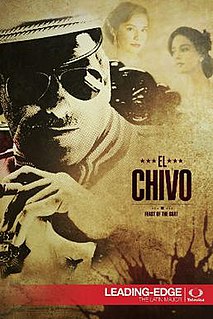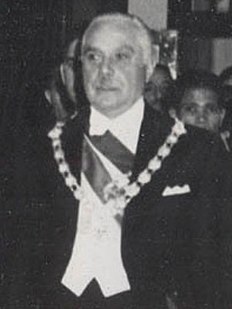
Joaquín Antonio Balaguer Ricardo was the President of the Dominican Republic who served three non-consecutive terms for that office from 1960 to 1962, 1966 to 1978, and 1986 to 1996.

Juan Emilio Bosch Gaviño was a Dominican politician, historian, short story writer, essayist, educator, and the first democratically elected president of the Dominican Republic for a brief time in 1963. Previously, he had been the leader of the Dominican opposition in exile to the dictatorial regime of Rafael Trujillo for over 25 years. To this day he is remembered as an honest politician and regarded as one of the most prominent writers in Dominican literature. He founded both the Dominican Revolutionary Party (PRD) in 1939 and the Dominican Liberation Party (PLD) in 1973.

The Feast of the Goat is a novel by the Peruvian Nobel Prize in Literature laureate Mario Vargas Llosa. The book is set in the Dominican Republic and portrays the assassination of Dominican dictator Rafael Trujillo, and its aftermath, from two distinct standpoints a generation apart: during and immediately after the assassination itself, in May 1961; and thirty-five years later, in 1996. Throughout, there is also extensive reflection on the heyday of the dictatorship, in the 1950s, and its significance for the island and its inhabitants.

The Congress of the Dominican Republic is the bicameral legislature of the government of the Dominican Republic, consisting of two houses, the Senate and the Chamber of Deputies. Both senators and deputies are chosen through direct election. There are no term limits for either chamber.

The Parsley Massacre was a mass killing that took place in October 1937 against Haitians living in the Dominican Republic's northwestern frontier and in certain parts of the contiguous Cibao region. Dominican Army troops, who came from different areas of the country, carried out the massacre on the direct orders of the Dominican dictator Rafael Trujillo. Haitian President Élie Lescot put the death toll at 12,168; in 1953, the Haitian historian Jean Price-Mars cited 12,136 deaths and 2,419 injuries. In 1975, Joaquín Balaguer, the Dominican Republic's interim Foreign Minister at the time of the massacre, put the number of dead at 17,000. Other estimates compiled by the Dominican historian Bernardo Vega went as high as 35,000.
Antihaitianismo, also called anti-Haitianism in some English sources, is prejudice or social discrimination against Haitians in the Dominican Republic.
The Dominican Party was the de facto only political party in the Dominican Republic during the dictatorship of Rafael Trujillo, who ruled the country from 1930 to 1961. Its symbol was a palm tree.

The Dominican Civil War took place between April 24, 1965, and September 3, 1965, in Santo Domingo, Dominican Republic. It started when civilian and military supporters of former President Juan Bosch overthrew acting President Donald Reid Cabral. The coup prompted General Elías Wessin y Wessin to organise elements of the military loyal to President Reid, known as loyalists, initiating an armed campaign against the so-called constitutionalist rebels. Allegations of foreign support for the rebels led to a United States intervention in the conflict, which later transformed into an Organization of American States occupation of the country. Elections were held in 1966, in the aftermath of which Joaquín Balaguer was elected into the presidential seat. Later in the same year international troops departed from the country.

Jacinto Bienvenido Peynado Peynado was the President of the Dominican Republic from August 16, 1938 until February 24, 1940 during the Trujillo Era. During his 31-year regime, dictator Rafael Trujillo appointed four individuals to serve as ceremonial Presidents while retaining direct, behind-the-scenes control of the Executive branch. Prior to ascending to the Presidency, Peynado served as Trujillo's Vice President from 1934 to 1938.
Elías Wessin y Wessin was a Dominican politician and Dominican Air Force general. Wessin led the military coup which ousted the government of Dominican President Juan Bosch in 1963, replacing it with a triumvirate. Wessin was also a key figure in the ensuing Dominican Civil War, which led to a United States military intervention into and occupation of the Dominican Republic in 1965.

Juan Rafael Estrella Ureña (born Santiago de los Caballeros, was a Dominican politician and lawyer. He served as the last acting president of the Dominican Republic from March 3, 1930 until August 16, 1930, when he started to serve as the vice president under Rafael Leónidas Trujillo.

General elections were held in the Dominican Republic on 16 May 1934. Two years earlier, the Dominican Party of President Rafael Trujillo had been declared the only legally permitted party. However, the country had effectively been a one-party state since Trujillo assumed office in 1930.

General elections were held in the Dominican Republic on 16 May 1938. At the time, the country was a single-party state, with the Dominican Party as the only legally permitted party.

General elections were held in the Dominican Republic on 16 May 1942. Rafael Trujillo was the only candidate in the presidential election and was elected unopposed, whilst his Dominican Party won every seat in the Congressional elections. They were the first elections in Dominican history in which women could vote.

General elections were held in the Dominican Republic on 16 May 1952. Héctor Trujillo was the only candidate in the presidential election, and was elected unopposed, although his predecessor and brother Rafael Trujillo maintained absolute control of the country. The Dominican Party won every seat in the Congressional elections.

General elections were held in the Dominican Republic on 16 May 1957. Héctor Trujillo was the only candidate in the presidential election, and was elected unopposed, although his predecessor and brother Rafael Trujillo maintained absolute control of the country. The Dominican Party won every seat in the Congressional elections.

El Chivo, is a telenovela produced by RTI Producciones and Televisa for United States-based television network Univisión and for Colombia-based television network Caracol Television. It is an adaptation of the book La fiesta del Chivo from Mario Vargas Llosa based on the history of Dominican Dictator, Rafael Trujillo. The telenovela began filming in May 2014.

Dominican Republic–Mexico relations refers to the diplomatic relations between the Dominican Republic and Mexico. Both nations have over the years joined several multilateral forums and are members of the Association of Caribbean States, Community of Latin American and Caribbean States, Organization of American States, Organization of Ibero-American States and the United Nations.












